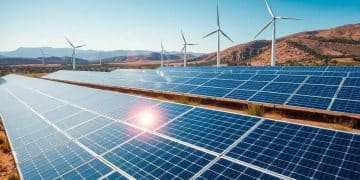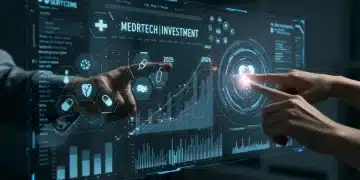Insights on renewable energy expansion and its benefits

Insights on renewable energy expansion highlight its benefits, including reduced emissions, job creation, and technological advancements, while addressing challenges in scalability and policy support.
Insights on renewable energy expansion are crucial in today’s world. As climate change becomes a pressing concern, many wonder how these developments affect their lives and our planet’s future.
The current state of renewable energy
The current state of renewable energy is a mixture of challenges and remarkable advancements. With greater awareness of climate change, nations are moving towards more sustainable solutions.
In 2020, renewable energy sources accounted for about 29% of global electricity generation. Wind, solar, and hydroelectric power continue to lead this growth. This shift not only benefits the environment but also creates economic opportunities.
Key Renewable Energy Sources
Let’s explore the primary sources that are driving this transition:
- Solar power: Harnessing sunlight using photovoltaic cells is becoming increasingly cost-effective.
- Wind energy: Wind turbines are being installed in various regions, using natural winds to generate electricity.
- Hydropower: This renewable source utilizes water flow to produce energy, providing significant contributions in many countries.
- Geothermal energy: Tapping into the Earth’s heat is becoming more popular, particularly in volcanic regions.
Despite the positive strides, it’s important to note the obstacles we face. Some of these include infrastructure limitations, regulatory hurdles, and competition with fossil fuels. For instance, solar and wind energy face intermittency issues, requiring backup systems to ensure reliable energy supply.
Global Efforts and Investments
Governments around the world are taking steps to promote renewable energy. Many countries are now setting ambitious targets for reducing carbon emissions. Public and private investments are pouring into research and development, aiming to make renewable technologies more efficient.
Countries like Germany and China are leading with innovative policies. They are actively integrating renewable sources into the energy grid. As a result, we can see a gradual decrease in reliance on fossil fuels.
Investments in renewable energy not only contribute to jobs but also foster technological advancements. In fact, according to reports, renewable sectors are rapidly becoming the backbone of the energy market.
In summary, the current state of renewable energy is evolving. As more focus shifts towards sustainable solutions, we can expect this transition to reshape our energy landscape dramatically. The combination of technology, policy support, and societal awareness is driving us toward a cleaner, greener planet.
Benefits of renewable energy expansion

The benefits of renewable energy expansion are numerous and play a crucial role in our transition to a sustainable future. As we shift away from fossil fuels, we open doors to a cleaner and more efficient energy landscape.
One significant advantage is the positive impact on the environment. By utilizing renewable sources, we can reduce greenhouse gas emissions, which contribute to climate change. This shift not only helps in mitigating climate issues but also enhances air quality, leading to healthier communities.
Economic Advantages
The economic benefits are also noteworthy. Investing in renewable energy creates jobs across various sectors, including manufacturing, installation, and maintenance. In fact, many regions are seeing local economies grow due to these new jobs, providing stability and opportunities for workers.
- Job creation: The renewable energy sector is one of the fastest-growing job markets.
- Energy independence: By utilizing local resources, countries can reduce dependence on imported fuels.
- Stable energy prices: Renewable energy can lead to more stable and predictable energy costs over time.
- Innovation: The expansion drives technological advancements that can lead to more efficient energy solutions.
Another important aspect is the contribution to energy security. By diversifying our energy sources, we lessen the risks associated with relying on a single type of fuel, which can fluctuate in price and availability. This diversification enhances energy resilience, especially during crises.
Social Benefits
Moreover, the transition to renewables can provide significant social benefits. Access to clean energy is essential for underserved communities, enabling them to improve their quality of life. With renewable energy projects, we can offer sustainable power to areas that historically have had limited access.
By promoting renewable energy expansion, we also inspire future generations to prioritize sustainability. Educating young people about clean energy technologies fosters a culture of innovation and responsibility towards our planet. As we invest in renewable solutions today, we shape a brighter and more sustainable future for all.
Challenges faced in renewable energy adoption
The challenges faced in renewable energy adoption are critical to understanding how we can accelerate the transition to cleaner energy. Despite its benefits, several obstacles hinder the widespread implementation of renewable technologies.
One of the main challenges is the initial cost of infrastructure. Building solar farms or wind turbines requires significant investment. Even though costs have decreased in recent years, the financial burden can be daunting for countries or companies trying to switch to renewables.
Intermittency Issues
Another notable issue is the intermittency of renewable energy sources. For instance, solar energy generation only occurs during daylight hours, and wind energy relies on consistent wind patterns. This variability necessitates backup energy systems to ensure a stable power supply.
- Energy storage: Developing effective energy storage solutions is vital for managing fluctuations in supply.
- Grid integration: Upgrading electricity grids is necessary to accommodate renewable energy sources efficiently.
- Regulatory hurdles: Navigating through changing policies and regulations can delay projects.
- Public opposition: Some communities may resist renewable projects due to aesthetic concerns or land use conflicts.
Furthermore, there are technological challenges related to the efficiency and performance of renewable systems. While technology is improving, there remains a need for research to enhance energy conversion rates and reduce waste. The need for skilled labor in this sector also poses a challenge, as training programs must catch up with industry demands.
Economic and Policy Barriers
From an economic standpoint, fossil fuels often receive more subsidies, making competing with them difficult for renewables. This imbalance makes it hard for clean energy alternatives to achieve market parity and limits investment in sustainable practices.
Government policies can also play a significant role in supporting or hindering renewable energy initiatives. In many regions, inconsistent policy frameworks can create uncertainty for investors. This unpredictability can slow down progress in adopting green technologies, making it essential to establish stable and long-term policy commitments.
While these challenges faced in renewable energy adoption are significant, they are not insurmountable. Addressing them requires coordinated efforts between governments, industries, and communities to find innovative solutions that pave the way for a sustainable energy future.
Future trends in renewable energy

The future trends in renewable energy indicate exciting advancements that will shape how we harness and utilize energy. As technology evolves, so do the opportunities for improving efficiency and accessibility in the renewable sector.
One of the key trends is the rise of solar power. With the cost of solar panels declining, more households and businesses are investing in solar energy. Innovations, such as solar roof tiles and improved battery storage, are making it easier to integrate solar systems into daily life.
Growth of Offshore Wind Power
Another significant trend is the expansion of offshore wind farms. These farms harness the strong winds found over oceans to generate large amounts of energy. As technology improves, the ability to build larger and more efficient turbines will increase, resulting in more power generated at lower costs.
- Floating wind turbines: These allow installation in deeper waters, increasing potential sites for renewable energy.
- Energy storage technology: Advances in batteries will enhance our ability to store energy for later use, making renewable energy more reliable.
- Smart grid technology: Integrating digital technology with the electricity grid allows for better management of energy distribution.
- Decentralized energy systems: Localized energy production can reduce transmission losses and increase community resilience.
Moreover, there’s a shift towards hydrogen as an energy carrier. Green hydrogen, produced with renewable energy, holds the promise of becoming a clean fuel alternative. Industries that rely on fossil fuels, like transportation and manufacturing, can benefit from this shift. As we further develop hydrogen technology, it could replace natural gas in many applications.
Digital Transformation and AI
Digital transformation is also playing a central role in the renewable energy sector. Artificial intelligence (AI) and data analytics are being utilized to optimize energy production and consumption. For instance, AI can predict energy demand and adjust supply accordingly, improving efficiency and reducing waste.
Furthermore, as electric vehicles (EVs) gain popularity, they will influence renewable energy consumption. With more EVs on the road, the demand for clean energy will rise, encouraging further investment in renewable resources. This shift not only helps in decreasing greenhouse gas emissions but also promotes cleaner urban air quality.
The future trends in renewable energy point towards a more sustainable and resilient energy system. By focusing on innovation and collaboration, we can maximize the potential of renewable sources and ensure a healthier planet for future generations.
In conclusion, the future of renewable energy looks promising. Innovations in technology are driving down costs and increasing efficiency. As we embrace solar, wind, and other renewable sources, we pave the way for a sustainable future. While challenges remain, such as intermittency and policy barriers, the collective efforts of governments, industries, and communities can overcome these hurdles. Together, we can create a cleaner, greener planet for generations to come.
FAQ – Frequently Asked Questions about Renewable Energy Expansion
What are the main benefits of renewable energy?
Renewable energy reduces greenhouse gas emissions, creates jobs, and decreases dependence on fossil fuels, promoting a healthier environment.
What challenges do we face in adopting renewable energy?
Challenges include high initial costs, intermittency of energy sources, regulatory hurdles, and the need for improved energy storage solutions.
How can technology improve renewable energy efficiency?
Advancements in technology, such as smarter batteries and AI, are enhancing the efficiency of energy production and optimizing consumption.
What role do governments play in renewable energy expansion?
Governments can support renewable energy through policies, incentives, and investments that encourage clean energy projects and infrastructure development.





